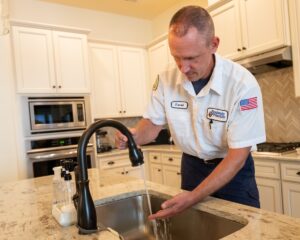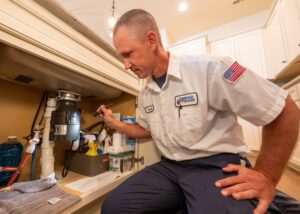Water Leaks: The Sneaky Culprits Behind Your Plumbing Problems
Ever had that moment where you’re going about your day and suddenly—squish—you step in an unexpected puddle? Or maybe you’ve noticed that mysterious stain on your ceiling getting bigger? Yeah, water leaks have a way of showing up at the worst times.
After 20 years of crawling under sinks and behind walls, I’ve seen just about every type of leak imaginable. The good news? Most leaks happen for pretty common reasons, which means we can catch them before they turn your home into an indoor swimming pool. Let’s chat about what’s really causing those drips and drops in your home.
Those Pesky Pipe Joints
You know those spots where two pipes connect? Those are pipe joints, and they’re like the knees of your plumbing system—they do a lot of work and tend to wear out first. Over time, all that pressure and temperature changes make these connections weaken.
How do you know if it’s a joint problem? Listen for dripping sounds inside your walls (especially when you run water), look for water stains spreading across your ceiling, or notice if your shower suddenly feels more like a sad sprinkle than a proper shower.
Old Pipes Getting Cranky
If your home has been around for a while (especially pre-1970s), you might have galvanized steel or copper pipes. These materials were great back in the day, but they don’t last forever. Minerals in your water slowly eat away at these pipes, causing tiny pinhole leaks or even complete pipe failure.
Take a peek at any exposed pipes in your basement or under sinks. See any discoloration, flaking, or a greenish tint on copper? That’s corrosion doing its thing. And if your water sometimes looks rusty—that’s another red flag.
When Good Water Pressure Goes Bad
Don’t get me wrong—we all love strong water pressure in the shower. But for your pipes? Too much of a good thing can be a disaster. High water pressure puts serious strain on your whole plumbing system.
Your pipes might be crying for help if your faucets make a loud knocking sound when you turn them off (we call that “water hammer”), or if water practically blasts out of the tap when you turn it on. If you’ve had multiple leaks in different spots, high pressure could be the hidden troublemaker.
Clogs: More Than Just a Slow Drain
We’ve all dealt with slow drains, but did you know a stubborn clog can actually cause leaks? When water can’t flow freely through a pipe, pressure builds up. Eventually, that pressure finds the weakest point in your plumbing and—voilà—you’ve got a leak.
Beyond the obvious slow drainage, listen for gurgling sounds from your pipes or notice if there’s a funky smell coming from your drains. These are signs that a clog is forming and could lead to bigger troubles.
Those Rubber Seals Aren’t Forever
When your dishwasher, washing machine, or other appliances were installed, little rubber seals were placed around connections to keep water where it belongs. Like anything rubber, these seals eventually dry out, crack, or just wear down.
Check around your appliances for small puddles, unusual dampness, or that musty smell that says “something’s not right here.” A failing seal might seem minor, but it can damage floors and cabinets before you know it.
The Dripping Faucet That’s Driving You Crazy
We’ve all been there—that midnight drip from the kitchen faucet that sounds like a bass drum in the silence. Beyond the annoyance factor, that little drip can waste hundreds of gallons of water and spike your bill.
The fix might be as simple as replacing a washer or O-ring, but don’t ignore it. If your faucet handle feels loose or water seeps around the base when you use it, it’s time for some attention.
The Silent Troublemakers: Underground and Slab Leaks
Some of the worst leaks are the ones you can’t see—those hiding under your foundation or yard. These sneaky leaks can go undetected for months while silently causing serious damage.
Watch for unexplained spikes in your water bill, warm spots on your floor (from hot water pipes leaking below), or cracks starting to form in your foundation. If you hear the sound of running water when nothing’s turned on, that’s a major red flag.
When Your Water Heater Decides to Retire
Water heaters work hard, heating gallons of water day after day for years. Eventually, the tank can develop rust, valves can fail, or internal parts can wear out.
Keep an eye out for puddles forming around the base, strange noises coming from the tank, or rusty-looking hot water. Water heater leaks can quickly turn from a small drip to a major flood, so don’t wait to get it checked.
When to Call in the Pros
Look, I’m all for DIY projects, but some plumbing issues need professional eyes. Give us a call if:
- You’ve got water stains but can’t figure out where they’re coming from
- Your water bill suddenly jumped without explanation
- You see visible corrosion on pipes
- There’s water pooling around appliances
- You hear dripping or running water inside walls
- You suspect a leak near your foundation
Remember our motto: Dependable + Trustworthy = DEPENDAWORTHY! We’re here to fix your leaks before they turn into disasters.
What Happens When You Call Us
Wondering what we do when you call us about a leak? Here’s the rundown:
First, we’ll check things out. If we can see the leak, great! If not, we break out our cool tech like acoustic sensors and infrared cameras to find it without tearing up your home.
Once we pinpoint exactly where the leak is hiding, we’ll figure out the best way to fix it with minimal disruption to your life.
Depending on what’s causing the leak, we might repair small cracks, replace damaged pipe sections, or reseal connections.After we fix the problem, we test everything to make sure it’s working perfectly.
Before we leave, we’ll chat about ways to prevent future leaks, like checking your water pressure or upgrading old plumbing.
And remember, we stand by our work with our “Fixed Right or You Don’t Pay” guarantee. That’s just how we roll.
Quick Answers to Common Questions
- Q: How do I know if my higher water bill means I have a leak?
A: If you haven’t changed your water usage habits but your bill is climbing, check for running toilets or dripping faucets. Still can’t find anything? Call us—you might have a hidden leak. - Q: Can I really use food coloring to check for toilet leaks?
A: Absolutely! Drop some food coloring in the tank and wait 15 minutes without flushing. If color shows up in the bowl, your toilet’s leaking. - Q: Are small leaks really a big deal?
A: Even a tiny drip can waste thousands of gallons yearly and lead to water damage or mold. Small leaks rarely stay small for long! - Q: What should I do if a pipe bursts?
A: Turn off your main water valve immediately, then call us. Quick action can prevent serious water damage.
Remember, leaks never fix themselves—they only get worse. If something seems off with your plumbing, give Benjamin Franklin Plumbing a call. We’ll make sure it’s fixed right the first time!

